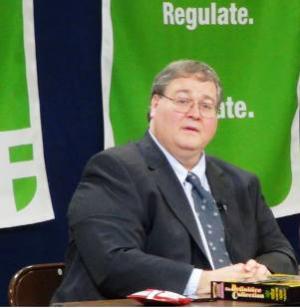The UN Commission on Narcotic Drugs held its high-level session in Vienna over the weekend. Behind a bland joint memorandum, though, signs of discord abound as criticism of the global prohibition regime grows louder.
Oregon looks like one of the likeliest places to legalize marijuana this year. There are two sets of initiative campaigns, and they both look well-positioned to make the ballot.
A federal agency has given the okay for researchers to buy marijuana from NIDA for a PTSD study, which is a first, those CBD medical marijuana bills keep moving in heretofore medical marijuana-unfriendly states, an effort to fold Washington state's medical marijuana system into its general legalization scheme has failed, and more.
Two more prison guards go down, so does a Tulsa cop and a former San Antonio cop.
Attorney General Holder endorses federal drug sentencing reductions, CBD medical marijuana bills move in the South, a New Hampshire decriminalization bill advances, Zohydro may get some competition, and the UN is generating plenty of news, and more.
No legalization for Maryland this year, the ASA national conference is coming soon, Utah (!) passes a package of policing reform bills, welfare drug testing goes down in flames in Indiana, the Swiss ponder cannabis clubs, and more.
Alaska state agencies complain that legalization will cost money (and they want some of it), Vermont cops complain the governor is soft on pot, federal prosecutors complain about reforming mandatory minimums, and more.
Federal drug prosecutions are declining, marijuana legalization moves forward in the Northeast, Pennsylvania counties pay for taking babies away from mothers over false positive drug tests, and more.
Fewer people are getting arrested for marijuana possession in Washington state after legalization -- imagine that! -- Kansas legislators want to drug test teachers, a New Jersey heroin and opiates panel has recommendations, Russell Brand goes to Vienna, and more.
The United Nations' Commission on Narcotic Drugs (CND) has wrapped up the High-Level Segment portion of its annual meeting in Vienna. The session revealed schisms among countries about future steps on global drug control even as the global drug bureaucrats gave signs of softening in some policy areas, especially around emphasizing public health as opposed to criminalization.
An indication of relaxation came when a key working group of the United Nations Office on Drugs and Crime (UNODC) announced the release of groundbreaking recommendations discouraging criminal sanctions for drug use. The Scientific Consultation Working Group on Drug Policy, Health and Human Rights of the UNODC -- which includes Nora Volkow, head of the US National Institute on Drug Abuse (NIDA) -- released the recommendations as the session got underway. The working group recommendations say 'criminal sanctions are not beneficial' in addressing the spectrum of drug use and misuse.

Getting down to business at the CND in Vienna (unodc.org)
The meeting ended with a formal
joint ministerial statement agreed to at the last minute after months of contentious wrangling, but one where countries failed to agree on a common approach and where certain fractious issues -- such as the use of the death penalty for drug offenses or even the mention of the term "harm reduction" -- were omitted entirely.
Countries critical of the global drug policy status quo, particularly from Europe and Latin America, were joined by an ever-stronger civil society presence at the CND. The message of reform grows ever louder and presages an especially contentious next step, the UN General Assembly Special Session (UNGASS) on Drugs, set for 2016.
It's not just change in the halls of the UN drug bureaucracies, but changes on the ground that are helping to drive the debate. Uruguay and two US state, Colorado and Washington, have legalized marijuana in apparent contravention of the global drug treaties, and Latin American countries in particular have for several years now expressed growing dismay at the drug war status quo.
Uruguay's decision to legalize marijuana commerce was "not a solution to dealing with the world's drug problem," UN Office on Drugs and Crime (UNODC) head Yuri Fedotov said just days ago, and the International Narcotics Control Board (INCB) called the Uruguayan government "pirates" for going up against the UN drug conventions. But the UN drug bureaucrats were singing a slightly softer tune last week in Vienna.

Taking in the discussions in Vienna (idpc.net)
"My impression from the debates so far is that the prevailing mood is to say no to dismantling the provisions of the conventions, but yes to returning to the original spirit of the conventions: protection of health, welfare, and safety of people,"
Fedotov said in anodyne remarks at the release of the ministerial statement.
"The provisions of the conventions indeed are flexible, human rights based, and founded on the protection of health. I would like particularly to stress the need of strengthening the public health in a comprehensive, balanced, scientific evidence-based approach, that is very important, and fully consistent with human rights standards," Fedotov continued. "There is also a growing need for every country to move away from compulsory treatments and punitive measures and towards embracing these approaches, including protection against HIV/AIDS, as envisaged by the Conventions."
The ministerial statement itself, a compromise document, for the most part blandly supported the existing international drug control regime, although it, too, signaled a shift toward a more public health-oriented approach, and it obliquely referenced ongoing dissent by noting "the ongoing discussions in some regions on how to address the world drug problem, in light of the current situation and policies, and emphasize the importance of a broad, transparent, inclusive and scientific evidence-based discussion among Member States, with inputs from other relevant stakeholders, as appropriate, in multilateral settings, on the most effective ways to counter the world drug problem consistent with the three international drug control conventions…"
But behind the smooth language of the official statements, there was real anger and dismay at the toll of more than a half-century of global drug prohibition.
"People have been sacrificed in our actions to tackle the drug problem," Colombian Justice Minister Gomez Mendez told delegates. "We call for more effective ways to achieve the objectives stated in international agreements. Alternatives are needed. Drug policies cannot travel at the speed of a telegraph while drug problems develop at the speed of broadband Internet."

ENCOD's Coffee Sniffer Brigade reenacted prohibitions of yore, to the bemusement of CND security. (encod.org)
"We should not be driven by ideologies and wishful thinking. We unfortunately know today that the idea of a drug-free world based on the belief that, if we eradicate supply, we will reduce demand, is not achievable. We should look to and evaluate alternative regimes appearing in North and South America and in Europe rather than just be silent about it", said the Czech Republic delegate, echoing the calls for drug policy reform made by not only Colombia, but also Guatemala, Ecuador, Mexico and Uruguay.
"Since 1961, due to a rigid and narrow interpretation of the UN drug conventions, there has been one single means to control the use of cannabis -- criminalization has been imposed, "said Diego Canepa, representative of the delegation of Uruguay. "We have don't have a magic recipe, but we are trying to find a way out and snatch the market away from traffickers. We have a responsibility to represent our citizens, and not to take the challenge and act accordingly would be an unforgivable error."
The Mexican delegation said that health policies should be encouraged instead of the criminalization of drug use and that a thorough review of the international drug strategies is required. The delegation of Guatemala highlighted that "the revision of the UN drug conventions is needed and that the Latin American hemispheric debate is ongoing."
"The failure of present drug policies has generated questions from governments, policy-makers, intellectuals and civil society organizations from across the region," said the Ecuadorian delegation. "Many voices are calling for a change in paradigm in the understanding and approach to the drug phenomenon."
Even the US delegation was sounding eerily reformist. Acting Office of National Drug Control Policy (ONDCP -- the drug czar's office) head Michael Botticelli called for continuing down "the path of criminal justice reform" and cited recent Obama administration moves to minimize mandatory minimum drug sentences.
But the call for reform came most loudly in the person of Eliot Ross, representing the International Network of People Who Use Drugs, who noted that human rights law and drug control law continued to be inconsistent, and called for a comprehensive overhaul of the treaties and amnesty for drug prisoners.
Changing the global drug control system for the better is agonizingly slow work -- it's been 16 years since hundreds of global intellectuals signed an open letter in The New York Times calling on the last UNGASS on Drugs to begin to adopt fundamental reforms. But, under the weight of rising pressure, the creaky machine is starting to move.
"We derive hope from the fact that, contrary to earlier CND meetings, there are now countries openly condemning prohibition as the basic answer to drug problems," said ENCOD (the European NGO Council for Just and Effective Drug Policies). "More than ever, not just governmental but UNODC officials see the writing on the wall. Instead of insisting on the need to create 'a drug free world', they refer to the need to protect people and societies from the damages of drugs and drug trafficking. We continue to urge governments to put these words into action and steadily direct their policy towards legal regulation as the only way to reduce harms and increase public safety. We hope for and expect major change at the 2016 UNODC meetings in New York. Prohibitionary drug laws are the problem. Removing them is the solution."
In a theatrical jab at prohibitions gone by, ENCOD activists reprised the strange saga of the Coffee Sniffer Brigade, a group of disabled soldiers who had to enforce the ban on coffee roasting and brewing that was imposed by the Prussian King Frederick the Great in the second half of the 18th Century. Delegates reacted first with reservation, then with support, the activists reported.
"The remaking of the system is happening before our eyes. For decades governments used the United Nations to push a one-size-fits-all approach," said Joanne Csete, deputy director of the Open Society Global Drug Policy Program. "The dissent we're seeing today is the deconstruction of the international drug war."
"This is the beginning of a serious re-think on drug control," said Ann Fordham, executive director of the International Drug Policy Consortium. "Billions of dollars have been wasted, millions of people have been criminalized, thousands of lives have been lost and the drug cartels carry on getting richer. Given this reality, the charade of a global consensus on drugs is now unacceptable, and some governments have found the courage to speak out."
back to top
Oregonians going to the polls this November could have the chance to vote twice to legalize marijuana, or maybe even three times. Two separate legalization initiative campaigns are underway there, and both have a good shot at actually making it onto the ballot. And one of those campaigns also includes a constitutional amendment that could also make the ballot.
Oregon very nearly joined Colorado and Washington in legalizing it in 2012, when the underfunded Oregon Cannabis Tax Act (
OCTA) got more than 47% of the vote. Prospects have only gotten brighter since then.
A recent poll showed solid majorities for a specific tax and regulate question (58%) and for a generic legalization question (64%).
And even sectors of the state's political establishment have suggested that legalization is an idea whose time has come. Gov. John Kitzhaber (D) urged the legislature to pass a bill that would put its version of a legalization initiative before the voters. That bill died when the session ran out, but it garnered some support in Salem.
This year, one initiative campaign, the Oregon Cannabis Tax Act campaign, a double-pronged effort led by the controversial but persevering medical marijuana entrepreneur Paul Stanford, who put OCTA on the ballot in 2012, is already well into the signature-gathering process, while the other, led by New Approach Oregon, is awaiting resolution of a legal challenge to its ballot language and chomping at the bit for petitioners to hit the streets.
The clock is ticking. Initiative petitioners have until July 3 to hand in the 87,213 valid voter signatures to qualify for the November ballot. The bar for the constitutional amendment is set higher, at 116,284 valid voter signatures.
The Oregon Cannabis Tax Act (OCTA) and the Oregon Cannabis Amendment (OCA) are both Stanford creations. OCTA would create a commission to regulate marijuana cultivation, processing, and sales, while the OCA would amend the state constitution to remove both criminal and civil sanctions for "the private personal use, possession or production of cannabis." The OCA would allow the state to reasonably regulate and tax marijuana commerce if it decided to.

OCTA proponent Paul Stanford (Facebook)
"We started gathering in early September, and we're well on the way now," said Stanford. "It's all a matter of money, and we've got some. And we've got time -- until July 3. We can easily get the rest of the way by then. We will be on the ballot."
The 2014 version of OCTA has some changes from the 2012 version. Gone is the historical preamble, which took up a quarter of the original OCTA, and which was derided by opponents. The new OCTA also adds limits for personal cultivation and possession, but generous ones: 24 ounces and 24 plants.
"We got 47% allowing people to grow and possess unlimited amounts for personal use, but people want limits," said Stanford. "Our limits are the same as those the legislature passed for medical patients in 2005."
The new OCTA retains the idea of marijuana commission to oversee legal commerce, but it has given authority over all appointments to that commission to the governor. The 2012 version had a majority of commission members elected by license marijuana business owners, a feature that left it open to charges it was creating a regulatory body captive to the industry it was supposed to regulate.
"The media portrayed this as akin to putting Philip Morris in charge of regulating the tobacco industry," Stanford explained. "So we put back to all appointed by the governor."
OCTA can win this year, and OCTA could have won in 2012 if it could have attracted sufficient funding, Stanford argued.
"In Washington, they spent $7 million; in Colorado, they spent $4 million; here in Oregon, we spent also half a million, and we only lost by 112,000 votes," he said. "Another $200,000 probably would have done it. It's the inverse law of cannabis reform funding -- the better an initiative is for the people and the planet, the less funding it gets from major funders."
While OCTA is getting some outside financial help this year -- Texas head shop owner Michael Kleinman's Foundation for Constitutional Protection has kicked in $97,000 so far, and Stanford said he hoped to announce a new funder this week -- it's gotten no support from big money groups like the Drug Policy Alliance, the Marijuana Policy Project, or Graham Boyd, the man with access to the funds of the late Peter Lewis.
New Approach Oregon's Control, Regulation, and Taxation of Marijuana and Industrial Hemp Act and its near-identical placeholder companion, the Control, Regulation and Taxation of Marijuana and Hemp Act of 2014 has, the group says, access to funding to get on the ballot, but it faces an obstacle of a different sort -- a legal challenge to its ballot language that has delayed signature gathering. That's largely the reason for the second version of the initiative; it is so far unchallenged, and if the first one is blocked by the state Supreme Court, signature gathering can then begin on the second.
"We're just waiting for our ballot title to get finalized, then we gather signatures," said Anthony Johnson, campaign manager for New Approach Oregon. "We expect the challenge to be done by the first of May, and our signature-gathering firm has assured us that if we are collecting by the first of May, we will have plenty of time to get on the ballot," he said.
"We've received pledges of a million dollars to get us on the ballot, and we expect to have time to gather the necessary signatures," he continued. While Johnson declined to get more specific about funding sources, he did say that "our funding team has always included the Drug Policy Alliance, as well as other national funders."
The New Approach initiative would legalize the personal possession of up to eight ounces and allow for the cultivation of four plants. And instead of a marijuana commission, it would rely on the Oregon Liquor Control Commission to regulate marijuana commerce, with a tax set at $35 an ounce.
Both Oregon initiative campaigns appear to be well-positioned to make the ballot this year, and that makes it one of the most likely to join the ranks of the legalization states this year. Alaska should get there first -- voters there go to the polls on their legalization initiative in August -- and Washington, DC, where signature-gathering for a legalization initiative should get underway shortly, is the other locale likely to go in 2014. That looks like it for this year, but at least in Oregon, they could do it twice, or even thrice on one ballot. And both campaigns say they will vote for any initiative that legalizes marijuana.
"If he makes the ballot, we will support any measure that improves the status quo," said Johnson.
"Or course I'll be voting for New Approach Oregon, and I encourage everyone else to," said Stanford.
That's the spirit.
back to top
A federal agency has given the okay for researchers to buy marijuana from NIDA for a PTSD study, which is a first, those CBD medical marijuana bills keep moving in heretofore medical marijuana-unfriendly states, an effort to fold Washington state's medical marijuana system into its general legalization scheme has failed, and more. Let's get to it:
NationalLast Friday, HHS granted permission for researchers to purchase marijuana from the National Institutes on Drug Abuse (NIDA) for a study of marijuana as a treatment for the symptoms of PTSD in US war veterans. That's the first time this has happened. The research is sponsored by the Multidisciplinary Association for Psychedelic Studies (MAPS). The DEA must still approve, but MAPS says it is "optimistic they will approve the study in a timely manner."
Also last Friday, ASA announced its second annual conference. The Americans for Safe Access Unity Conference will take place in Washington, DC, on April 5-7. Click on the link for more details.
Alabama
On Tuesday, a CBD medical marijuana bill was approved by a House committee. The bill has passed the Senate after being amended to become a research bill on the impact of using a marijuana derivative. Senate Bill 174 passed the House Judiciary Committee and now awaits a House floor vote.
Arkansas
Last Friday, advocates for a medical marijuana initiative said they had collected 15% of the signatures needed to qualify for the November ballot. Arkansans for Compassionate Care said they have about 10,000 signatures. They need 62,000 to make the ballot, and have until July 7 to do so. A similar initiative was narrowly defeated there in 2012.
California
Last Wednesday, opponents of Butte County's recent cultivation ordinance handed in some 12,000 signatures on a petition to abolish it. The February ordinance limited the size of outdoor gardens to 50 square feet on properties from a half-acre to five acres in size. Petitioners need only 7,600 of the signatures to be found valid, which would then force county supervisors to take up the matter again. In the meantime, enforcement of the ordinance is on hold.
On Tuesday, Shasta County supervisors voted to put a ban on marijuana growing to the voters. The supes had voted to ban all outdoor cultivation, but a successful petition drive to challenge the ordinance forced them to reconsider. They could have just repealed the ban, but instead voted unanimously to put it on the November ballot and let the voters decide.
Georgia
Last Wednesday, a CBD medical marijuana bill was approved by a Senate committee. The Senate Health and Human Services Committee unanimously approved House Bill 885, which would allow patients to use CBD-based cannabis oils. It also amended the bill to allow parents to bring the oil into the state without facing penalties. The bill has already passed the House and now awaits a Senate floor vote.
Iowa
On Monday, a new poll had support for medical marijuana at 81%. The Quinnipiac Poll results are dramatically different from a recent Iowa Poll, which found 59% of Iowa adults said they supported "legalizing marijuana for medicinal purposes." But no matter what the polls say, medical marijuana bills get no traction in the Hawkeye State.
Kentucky
On Wednesday, a CBD medical marijuana bill passed the Senate. The Senate passed a bill allowing doctors to prescribe and patients to use CBD cannabis oil for medical reasons. The bill passed with no opposition. Senate Bill 124 now goes to the House.
Maryland
On Tuesday, the House passed a full-on medical marijuana bill. The House overwhelmingly approved House Bill 1321, which includes dispensaries. The bill now goes to the Senate.
Nevada
Last Friday, the Board of Health approved regulations for dispensaries. They are allowed under a law passed last year, which goes into effect April 1. It's not quite a done deal; they must undergo a final review by the Legislative Commission on March 28. After final approval, there will be a 45-day notice announcing the date applications will be accepted. Once the application period opens, there will only be a 10-day window for accepting them. After the application period closes, the state must make a decision on each application within 90 days of receiving it.
South Carolina
Last Thursday, a CBD medical marijuana bill won a Senate subcommittee vote. The bill must still pass a committee vote before going to the Senate floor. Meanwhile, companion legislation is advancing in the House. The bill would allow the use of CBD cannabis oil for those suffering from epilepsy.
Utah
Last Thursday, a CBD medical marijuana bill passed the Utah legislature. House Bill 105 now goes to the desk of Gov. Gary Herbert (R). It would allow children with epileptic seizures to use CBD cannabis oil.
Washington
Last Thursday, an effort to fold the state's medical marijuana system into its marijuana legalization scheme died in the legislature. Lawmakers were seeking to establish regulation of the medical market as the state's new voter-approved recreational market is about to take hold this summer. The week before, the Senate passed a measure that moved to merge the medical with the still-developing legal recreational market. It would have eliminated unlicensed dispensaries, established a patient registry, and reduced the amount of marijuana patients could grow and possess. That leaves the unregulated industry in a sort of limbo.
[For extensive information about the medical marijuana debate, presented in a neutral format, visit MedicalMarijuana.ProCon.org.]
back to top
Two more prison guards go down, so does a Tulsa cop and a former San Antonio cop. Let's get to it:
In Tulsa, Oklahoma,
a Tulsa police officer was arrested Monday on suspicion he was involved in drug trafficking. Tyrone Jenkins, 40, an 18-year veteran, went down after the department received a tip about his role in alleged criminal activity. He is charged with conspiring to traffic cocaine, violating the Oklahoma Computer Crimes Act, and possessing a firearm during the commission of a felony. He's out on bond now.
In San Juan, Puerto Rico, a former Puerto Rico prison guard was sentenced last Thursday to 37 months in federal prison for trying to smuggle heroin into a state prison by delivering it to an inmate in the parking lot of a medical center. William Joel Medina, 32, and a co-conspirator agreed to receive $2500 to deliver heroin to an inmate, but unfortunately for them, the drug dealer they were scoring from was an undercover agent. Medina copped to one count of conspiracy and attempt to distribute controlled substances.
In San Antonio, a former San Antonio police officer was sentenced Monday to 18 months in federal prison for soliciting a bribe to make a drug charge go away. Curtis Lundy, 37, had responded to an assault and, after detaining a person in connection with the assault, found that person in possession of a small amount of marijuana. He said he could make the charge go away for $400, although he later raised his fee to $500. He pleaded guilty in October to one count of theft of honest services by wire fraud.
In Lebanon, Ohio, a former Lebanon Correctional Facility supervisor was sentenced Monday to four years in prison for selling steroids. Brian Bendel, a 19-year correctional officer, was convicted on one count of trafficking. Investigators said they didn't think Bendel was selling steroids at the jail.
back to top
Attorney General Holder endorses federal drug sentencing reductions, CBD medical marijuana bills move in the South, a New Hampshire decriminalization bill advances, Zohydro may get some competition, and the UN is generating plenty of news, and more. Let's get to it:

Attorney General Eric Holder endorses federal drug sentence reductions. (usdoj.gov)
Marylanders Rally for Legalization. Nearly 100 supporters of sweeping changes in Maryland's marijuana laws rallied in Annapolis Thursday before planned legislative hearings on bills to legalize -- or at least decriminalize -- possession of the drug. The House Judiciary Committee is hearing a series of marijuana reform bills this afternoon, including a legalization bill (House Bill 880) from Rep. Curt Anderson (D-Baltimore).
Maryland Poll Has Slim Majority for Legalization. As the legislature considers marijuana reform bills, a new Goucher Poll has support for legalization at 50.1%, with 39.4% opposed. The poll also had a whopping 89.6% in favor of medical marijuana.
New Hampshire Decriminalization Bill Passes House. The House approved a decriminalization bill by a veto-proof margin Wednesday. House Bill 1625, sponsored by Rep. Adam Schroadter (R-Newmarket) and a bipartisan group of seven cosponsors including Sen. Jeff Woodburn (D-Dalton), would make possession of up to one ounce of marijuana punishable by a civil fine of up to $100. It would also make cultivation of up to six plants a Class A misdemeanor instead of a felony. Currently, possession of any amount of marijuana is a misdemeanor punishable by up to one year in prison and a fine of up to $2,000. Now, it's on to the state Senate.
Medical Marijuana
Kentucky Senate Approves CBD Medical Marijuana Bill. The Senate passed a bill allowing doctors to prescribe and patients to use CBD cannabis oil for medical reasons Wednesday. The bill passed with no opposition. Senate Bill 124 now goes to the House.
Georgia Senate Committee Approves CBD Medical Marijuana Bill. The Senate Health and Human Services Committee unanimously approved House Bill 885, which would allow patients to use CBD-based cannabis oils. It also amended the bill to allow parents to bring the oil into the state without facing penalties. The bill has already passed the House and now awaits a Senate floor vote.
South Carolina Senate Panel Approves CBD Medical Marijuana Bill. A subcommittee of the Senate Committee on Medical Affairs approved a bill allowing people suffering from epilepsy to use CBD cannabis oil Wednesday. Senate Bill 1035 still needs to pass the full committee. Similar legislation is moving in the House.
Hemp
Tennessee Hemp Bill Wins House Committee Vote. A bill that would allow the cultivation of hemp for research purposes passed the House Agriculture and Natural Resources Committee Wednesday. House Bill 2445 now heads for the House Finance Ways and Means Committee.
Drug Testing
Mississippi Food Stamp Drug Testing Bill Heads to Governor. A bill that would require applicants for Temporary Assistance for Needy Families (TANF) to undergo drug testing if there is a suspicion they are using drugs passed the Senate Wednesday and now goes to the desk of Gov. Phil Bryant (R), who has made it a keystone of his legislative agenda. House Bill 49 passed the Senate after debate in which supporters couched the program as an additional benefit that could help somebody struggling with addiction, while opponents said it was unfairly singling out the poor.
ASAM White Paper Calls for Vastly Expanded Drug Testing. The American Society for Addiction Medicine (ASAM) has published a white paper by former NIDA director and present day drug testing consultant Robert Dupont calling drug testing "underutilized" and arguing it should be expanded to be include people of all ages in virtually all aspects of daily life. The totalitarian vision is ably critiqued by NORML drug testing expert Paul Armentano (click the title link), as well as by progressive talk radio host Thom Hartman, who countered Dupont with an op-ed entitled "It's Time to End All Drug Testing." Both Armentano's and Hartman's critiques are worth the read.
Prescription Opioids
Oxycontin Maker Offers Alternative to Zohydro. Purdue Pharma, the manufacturer of Oxycontin, says it has completed testing of an abuse-resistant version of the painkiller hydrocodone, a surprise development that could derail sales of the recently launched Zohydro, a similar medication that has been criticized for lacking such safeguards. Purdue Pharma says it plans to submit its extended-release hydrocodone drug to the Food and Drug Administration later this year. Shares of rival Zogenix Inc. plunged more than 20% after the announcement, which appears to jeopardize sales of the company's just-launched drug Zohydro. Zogenix began shipping Zohydro to pharmacies last week.
Sentencing
Attorney General Holder Endorses Proposal to Cut Federal Sentences. US Attorney General Eric Holder today endorsed a proposal from the US Sentencing Commission to reduce the sentences of people convicted of federal drug trafficking offenses by about a year, from an average of 62 to months to an average of 51 months. "This overreliance on incarceration is not just financially unsustainable," Holder said. "It comes with human and moral costs that are impossible to calculate."
International
Listen to the UN Commission on Narcotic Drugs Sessions. You can do it by clicking on the UNODC's webcast page at the link above. Also, Oregon activist Doug McVay has uploaded audio of the second part of today's plenary session here. There will be more updates on McVay's weekly Drug War Facts podcast.
UNODC Panel Says Criminalizing Drug Use "Not Beneficial". Today, a key working group of the United Nations Office on Drugs and Crime (UNODC) announced the release of groundbreaking recommendations discouraging criminal sanctions for drug use. The Scientific Consultation Working Group on Drug Policy, Health and Human Rights of the UNODC -- which includes Nora Volkow, head of the US National Institute on Drug Abuse (NIDA) -- is releasing the recommendations at the High-Level Segment of the 57th UN Commission on Narcotic Drugs. The working group recommendations say "criminal sanctions are not beneficial" in addressing the spectrum of drug use and misuse.
UNODC Sees "Serious Setbacks" in Fight Against Drugs. Addressing the opening session of the Commission on Narcotic Drugs (CND), UN Office on Drugs and Crime (UNOC) head Yury Fedotov said the global fight against drugs had suffered "serious setbacks," including record opium crops in Afghanistan, violence linked to drug trafficking in Central America, and weak West African states succumbing to the blandishments of traffickers. While he said legalization was no solution, he did add that: "A public health response to the drug use problem should consider alternatives to penalization and incarceration of people with use disorders."
Caricom Creates Commission to Study Marijuana Legalization. The leaders of the Caricom Caribbean trade bloc announced today that they are creating a commission to study the impact of legalizing marijuana. The move came at the end of a two-day summit where members discussed a preliminary report on decriminalization. The commission is charged with presenting its report in early July for a Caricom summit in Antigua.
Iran Executed More Than 300 People for Drugs Last Year, Report Says. A report from the nonprofit group International Campaign for Human Rights in Iran released Wednesday says Iran executed 331 people on drug-related charges last year. The drug executions accounted for almost half of all executions in the Islamic Republic, the report found. The UN Office on Drugs and Crime sponsors anti-drug programs in Iran, and is under increasing pressure from European donor countries to put in place measures to stop its support from contributing to the death penalty.
Dire Prospects for Afghanistan Drug War, Analysis Finds. A new analysis from Alex Pollard-Lipkis of Foreign Policy in Focus finds that "if costly drug war strategies in Afghanistan have been unsuccessful even with a strong US military presence, they won't stand a chance after the US withdraws." The analysis critiques contemporary US approaches and peeks into the post-US future. Click on the title link to read the whole thing.
back to top
No legalization for Maryland this year, the ASA national conference is coming soon, Utah (!) passes a package of policing reform bills, welfare drug testing goes down in flames in Indiana, the Swiss ponder cannabis clubs, and more. Let's get to it:

A bill before Utah's governor would begin to rein in SWAT in the Beehive State. Only Maryland has done something similar.
Michigan Activists Plan Slew of Local Reform Initiatives. Marijuana reform activists are planning "a tsunami move in November 2014," with plans to put initiatives aimed at legalizing or decriminalizing possession, use or transfer of small amounts of marijuana on private property by persons 21 or older on the local ballot in at least eight towns and cities, and perhaps a dozen more. The Safe Michigan Coalition, the folks behind successful initiatives in Lansing, Ferndale, and Jackson last year, are also behind this effort.
NORML PAC Endorses Tommy Wells for DC Mayor. NORML PAC, the campaign and lobbying arm of NORML, announced today that it is endorsing Councilman Tommy Wells for mayor of Washington, DC. "Councilman Wells is a passionate crusader for the cause of marijuana law reform," stated NORML PAC manager Erik Altieri, "Wells showed his skill and acumen for the issue when he championed the District's marijuana decriminalization measure, which was overwhelmingly approved by the DC City Council just this month. The District of Columbia would greatly benefit from having his compassion, knowledge, and strong leadership in the mayor's office. Under a Tommy Wells administration, DC will continue to roll back its failed prohibition on marijuana and move towards a system of legalization and regulation."
Maryland Legalization Bill Dies, But Decriminalization Bill Still Lives. A bill that would have legalized marijuana in Maryland, House Bill 880 from Rep. Curt Anderson (D-Baltimore), died for lack of support in committee yesterday, but a decriminalization bill, Senate Bill 364, filed by Sen. Robert Zirkin (D-Montgomery) passed the Senate and is now before the House Judiciary Committee.
Colorado Appeals Court Rules Some Marijuana Convictions Can Be Thrown Out. Some people convicted of possessing small amounts of marijuana can ask for those convictions to be thrown out under the law that legalized recreational marijuana in Colorado, the state's second-highest court ruled Thursday. The Colorado Court of Appeals said people whose cases were under appeal when Amendment 64 on recreational marijuana took effect in December 2012 are eligible to have their convictions reversed. The case is Colorado v. Brandi Jessica Russell.
Medical Marijuana
ASA National Conference in Washington, DC, April 5-7. The country's leading medical marijuana advocacy group, Americans for Safe Access (ASA), formally announced today its second annual Unity Conference, "Navigating Medical Cannabis in the Mainstream," to be held in Washington, DC on April 5-7, 2014. The conference will highlight medical and legal experts, policymakers, and a wide array of workshops and panels focusing on scientific research, strategic planning, and skills building. Click on the links for more details.
Washington Medical Marijuana Regulation Bill Dies. A legislative effort to roll Washington's medical marijuana program into its I-502 legal marijuana system has died at the last minute after House Republicans tried to use it to divert a share of marijuana tax revenue to cities and counties. Senate Bill 5887 sponsor Sen. Ann Rivers (R-La Center) said the bill was doomed by "immovable positions" even after a last-minute push by the governor. The bill would have required existing dispensaries to either get legal under I-502 or close, would have ended collective gardens, and would have reduced the amount of marijuana patients could possess and the number of plants they could grow.
Utah CBD Medical Marijuana Bill Passes Legislature. A bill that would allow children with epilepsy to use CBD cannabis oil has passed the legislature and now heads for the governor's desk. House Bill 105 won final approval in the House Thursday.
Drug Testing
Pre-Job Offer Drug Tests Violate ADA, Federal Court Rules. Pre-offer drug tests to determine the use of both legal and illegal drugs violates the Americans with Disabilities Act's (ADA) prohibition on pre-offer medical inquiries, a federal court in Pennsylvania ruled last week. The ADA contains an exception for tests solely "to determine the illegal use of drugs," but the court held that the urine drug screens qualified as medical exams because they tested not just for drugs but also for other medical purposes. The case is EEOC v. Grane Healthcare Co. and Ebensburg Care Center, LLC, d/b/a Cambria Care Center.
Indiana Welfare Drug Testing Bill Dies on Ties Vote in Senate. A bill to drug test welfare recipients suspected of using drugs died last night on a dramatic tie vote in the Senate. Senate Bill 1351 had already passed the House by a margin of 81-17, but Senate opponent said the measure unfairly targeted poor people and that other states that have adopted such programs have found they were not cost effective.
Law Enforcement
Utah Legislature Passes Policing Reform Bills. Three bills to impose some controls on law enforcement have been sent to the governor's desk in Utah. House Bill 70 originally would have limited the use of "dynamic entry" search warrants to situations involving violent crime, but was watered down. It still, however, imposes some restrictions on such searches. Senate Bill 185 would require police agencies with SWAT teams to report on why and how often they are used. Only Maryland has approved a similar law. And House Bill 185 requires police to obtain a warrant before searching the contents of a cell phone, including bulk data collection through technologies like Stingray.
Drugged Driving
Drugged Driving Bill Passes Vermont House. A bill that makes it easier for police to charge drivers with drugged driving passed the House Thursday. House Bill 501 changes existing law to use the same definition of "under the influence"of drugs as has been established for alcohol. Under current law, drugged driving can only be proven if someone drives unsafely, but the proposed law would change that to enable a conviction "when the person is under the influence of any other drug or under the combined influence of alcohol and any other drug." The state Supreme Court has held that any drug presence constitutes "under the influence." The bill now heads to the Senate.
International
Swiss Cities Consider Backing Cannabis Clubs. Municipal governments in at least five Swiss cities are considering plans to allow "cannabis clubs" or user associations. Local governments in Basel, Bern, Geneva, Lausanne, and Zurich are contemplating the move, with Geneva taking the lead. A working group will present a final proposal to authorities in June, but the move would require changes in federal law.
British Deaths From New Synthetics "Inflated," Former Drug Advisors Say. The National Program on Substance Abuse Deaths (NSPAD) reported 68 deaths in 2012 from the use of "legal highs" or new synthetic drugs, but two former government drug advisors say that figure includes many deaths from substances that "are already illegal, not new, and/or not psychoactive." Professor David Nutt and Dr. Les King of the Independent Scientific Committee on Drugs said only 11 of the 68 deaths actually occurred with new synthetics. "What is certain is that if the current government review of legal highs is to be taken seriously and lead to health improvements then there must be a proper definition of terms and improved data collection," they said. "Moreover the data must be properly and independently audited so the effects of any change in the law can be properly evaluated."
(This article was published by StoptheDrugWar.org's lobbying arm, the Drug Reform Coordination Network, which also shares the cost of maintaining this web site. DRCNet Foundation takes no positions on candidates for public office, in compliance with section 501(c)(3) of the Internal Revenue Code, and does not pay for reporting that could be interpreted or misinterpreted as doing so.)
back to top
Alaska state agencies complain that legalization will cost money (and they want some of it), Vermont cops complain the governor is soft on pot, federal prosecutors complain about reforming mandatory minimums, and more. Let's get to it:

What will keep this Rasta smiling? Jamaican ganja farmers have some ideas. (wikimedia.org)
California Cannabis Hemp Initiative Dead for 2014. The number of active marijuana legalization initiatives in California has dropped to one after the California Cannabis Hemp Initiative failed to qualify for the ballot by its signature-gathering deadline. That leaves only the Marijuana Control, Legalization & Revenue Act, which, barring a miracle, isn't going to make the ballot, either. It needs 504,000 valid voter signatures by April 18, but only has 10,000. The big money is waiting for 2016 in California.
FBI Refuses to Do Washington State Marijuana Industry Background Checks. The FBI is refusing to do criminal history background checks on people applying for legal marijuana licenses in Washington state, even though it has done such checks in Colorado. The agency has balked for the past year at requests from state officials, and refused to tell the Associated Press why. The state has issued three licenses so far; for those, they relied on background checks by the Washington State Patrol, which would catch in-state criminal convictions, but might miss out-of-state ones.
Alaska Agencies Claim Legalization Will Cost Millions. In a new report, Alaska state agencies said that if the marijuana legalization initiative passes there, it will cost the state between $3.7 million and $7 million to implement and enforce the new law. Included in that figure are law enforcement requests for "at least three additional Alaska State Trooper positions to target the illegal diversion and exportation of marijuana lawfully cultivated in Alaska" and nearly $1.5 million for a media campaign to warn of stoned driving and training for troopers to recognize when a driver is high. The report doesn't address increased tax revenues from legalization.
Vermont Cops Accuse Governor of Being Soft on Pot. The Vermont Association of Chiefs of Police, Vermont Sheriffs Association and the Vermont Police Association said in a press release Friday that they are united against efforts for marijuana legalization and that, while they have previously expressed concern about Gov. Peter Shumlin's (D) "tolerance of marijuana," their concerns had been ignored. They also called marijuana "a gateway drug."
Washington Legislature Approves Sale of Hash and Hash Oil. The state legislature has approved a bill that would legalize the sale of hashish and hash oil at state-licensed marijuana retail outlets.House Bill 2304 now goes to the desk of Gov. Jay Inslee (D).
Medical Marijuana
HHS Gives Go-Ahead for MAPS PTSD Research Study. The federal Department of Health and Human Services granted permission Thursday for the Multidisciplinary Association for Psychedelic Studies (MAPS) to purchase research-grade marijuana from the National Institute on Drug Abuse (NIDA) for its planned study of marijuana for symptoms of PTSD. MAPS notes that this is the first time in the 22 years it has been trying to start marijuana drug research that it has actually won permission to purchase marijuana from NIDA. It's not quite a done deal yet, though; the DEA still as to approve. MAPS said it was "optimistic" DEA would do so.
Florida Poll Shows Strong Support for Initiative. A University of North Florida poll released Monday has the state's medical marijuana amendment initiative well-positioned to win in November. The initiative has already qualified for the ballot. The poll had 74% of registered voters planning to vote for it. Because it is a constitutional amendment, it will need 60% approval to pass.
Iowa Poll Has Support for Medical Marijuana at 81%. In a new Quinnipiac Poll, 81% of Iowa voters said they would support "allowing adults in Iowa to legally use marijuana for medical purposes if their doctor prescribes it." Even among Republicans, 68% agreed. That's in sharp contrast to a recent Iowa Poll that had only 59% supporting "legalizing marijuana for medicinal purposes."
Michigan Chamber of Commerce Wants No Jobless Benefits for Fired Medical Marijuana Users. Michigan's leading business group is urging the state appeals court to rule out jobless benefits for people who are fired for using medical marijuana. The move comes as the court weighs the cases of people who sought benefits after being fired for using medical marijuana. Lower court judges have ruled in favor of the workers, who argued that they shouldn't be denied benefits after losing their jobs for using marijuana legally under state law.
Arkansas Medical Marijuana Initiative Has 15% of Necessary Signatures. A signature-gathering campaign to put medical marijuana on the November ballot has collected about 15% of the signatures needed to qualify, Arkansans for Compassionate Care said on Thursday. The initiative is one of two gathering signatures this year. It has until July 7 to hand in 62,000 qualified signatures, and has about 10,000 so far.
Nevada Board of Health Approves Dispensary Regulations. The Board of Health gave its approval Friday to rules to regulate new dispensaries. The next and final step is approval by a legislative commission on March 28. A 2013 law allowing dispensaries goes into effect April 1. But even then, there will be a 45-day notice announcing the date applications will be accepted. Once the application period opens, there will only be a 10-day window for accepting them. After the application period closes, the state must make a decision on each application within 90 days of receiving it. And then dispensaries have to grow their supply. Maybe by year's end…
Drug Policy
House Passes Bill to Force President to Enforce Federal Drug Laws. The Republican-controlled US House last week passed the Enforce the Law Act (House Resolution 4138), which would allow Congress to sue the president for failing to execute federal laws. While the bill is a broad attack on the Obama administration, one key supporter, Rep. Bob Goodlatte (R-VA), singled out the "selective non-enforcement" of part of the Controlled Substance Act in medical marijuana and legal marijuana states as a major concern. Democratic Senate Majority Leader Harry Reid (D-NV) said the bill was "dead on arrival" in the Senate.
Law Enforcement
Nevada County Settles Up in Interstate-80 Cash Seizure Cases. Humboldt County, Nevada, where sheriff's deputies developed a habit of stopping travelers on I-80 and seizing their cash through threats of arrest or impoundment even though no drugs were found, has settled a lawsuit over the practice. Two men from whom thousands of dollars were taken sued and have won their money back and attorneys' fees. The county District Attorney's Office also said Friday it had launched an internal review of the county's "forfeiture program," but that it had seen no evidence of illegal stops or other wrongdoing on the part of Sheriff Ed Kilgore or his deputies. The lawsuits claimed the cash seizures were part of a pattern of stopping drivers for speeding as a pretext for drug busts in violation of the Constitution.
Illinois Bill to Ban Kratom Filed. Rep. Dennis Reboletti (R-Elmhurst) has filed a bill to outlaw kratom, a Southeast Asian herb with psychoactive properties. The plant is not banned federally, although the DEA has it on its list of "drugs of concern." Indiana is the only state so far to have criminalized it, designating its active ingredients as controlled substances. The Illinois bill is House Bill 5526.
Sentencing
Some Federal Prosecutors Oppose Eliminating Mandatory Minimums. Attorney General Holder's move to eliminate mandatory minimum sentences for most drug offenders is running into flak from some prosecutors, The Washington Post reported Thursday. They complained that "tough sentencing policies provide a critical tool to dismantle drug networks by getting cooperation from lower-level defendants and building cases that move up the criminal chain of command." The prosecutors spoke out at a hearing of the US Sentencing Commission where Holder endorsed changing federal sentencing guidelines to reduce drug sentences in most cases.
International
NGOs to Address Inter-American Human Rights Commission on Drug Policy and Human Rights. For the first time, the Inter-American Human Rights Commission has granted an audience to hemispheric civil society groups to address the impact of the war on drugs on human rights in the Americas. The audience will take place in Washington, DC, on March 25. Click on the link to see the impressive list of organizations that will participate.
Jamaican Rastas Want Legal Marijuana Monopoly. The newly formed Westmoreland Hemp and Ganja Farmers Association said licenses to grow and sell marijuana upon legalization should be limited to Rastafarians and other poor people, who have been victimized for decades for cultivating the herb. "We will not stand by and watch anybody outside of Rastafari and grassroots people take over this product. And we make no apology," association President Ras Iyah V declared during his address at the launch of the organisation at the MXIII Lawn in Negril on Sunday night. "We are saying this loud and clear to the Government, we are saying it to society, and we are saying it to the international community. Otherwise, we will take to the streets and turn Jamaica upside down -- and we make no apology. Because we not going take baton lick and brutality and all of a sudden now when the legalization aspect come, a some rich people come tek it ova -- people who used to scoff and scorn at the very mention of the herb name ganja," he added. "The WHGFA's objectives are to make sure that those who have paid the price -- who have been going to jail, going to prison, getting the baton licks, who have been planting the herb and it get cut down by police and soldiers, and yet have been persistent with this product -- that the rights of these individuals are protected."
Mexico Moves to Rein In Anti-Cartel Vigilantes. Leery of having created a Frankenstein monster, Mexican authorities moved last week to put anti-cartel vigilante groups on notice that their illegal tactics will no longer be tolerated. Locals who saw the vigilantes as saviors from cartel extortion and threats now complain of similar behavior from the vigilantes, and the government says it now no longer needs them. Several vigilante leaders have been arrested on murder and other charges.
back to top
Federal drug prosecutions are declining, marijuana legalization moves forward in the Northeast, Pennsylvania counties pay for taking babies away from mothers over false positive drug tests, and more. Let's get to it:

Declining federal drug prosecutions could have an impact here. (supremecourt.gov)
New Hampshire Legalization Bill Moves Forward. A bill to legalize and regulate marijuana like alcohol has passed out of the House Ways and Means Committee after the committee adopted an amendment to simplify the tax structure and improve regulations. House Bill 492 then got a "no pass" from the committee, but now goes to the House floor for a second vote. The House already approved the bill in January, after overturning a similarly negative recommendation from the Criminal Justice and Public Safety Committee. If it passes the House again, it then goes to the Senate.
New Jersey Legalization Initiative Bill Introduced. Assemblymen Reed Gusciora (D-Trenton) and Michael Patrick Carroll (R-Morris Plains) have introduced Assembly Bill 2842, a bill that, if approved by the legislature and signed by the governor, would put the decision on whether to legalize marijuana in the hands of the voters. The bill would legalize the possession of up to an ounce of marijuana and related paraphernalia. It does not address taxation or allow for commercial sales.
Medical Marijuana
Maryland House Passes Medical Marijuana Bill. The House Monday overwhelmingly approved a bill that would make Maryland a full-fledged medical marijuana state. House Bill 1321 now moves to the Senate.
Drug Testing
Pennsylvania County Pays for Taking Baby from Birth Mother Over False Positive Drug Test. Lawrence County Children and Youth Services has settled, for $160,000, a lawsuit filed by a woman whose child was taken away following a false positive opiate test apparently caused by pasta salad. It's not the first time, either. Last July, Jameson Hospital and Lawrence County Children and Youth Services agreed to pay $143,500 to settle a similar lawsuit filed by a woman whose infant was taken by a false positive drug test apparently caused by consumption of a poppy seed bagel. A third local case is also pending. Last week, another woman Magee-Womens Hospital of UPMC, saying a false positive drug test apparently spurred by poppy seeds in farmer's market bread resulted in an Allegheny County Children Youth and Families investigation of her family.
Drug Policy
Maine Hearing Sees Criticism of Governor's Law Enforcement-Heavy Drug Policy. The legislature's Criminal Justice and Public Safety Committee Monday heard strong criticism of Gov. Paul LePage's (R) recently announced plan to address drug problems in the state by ratcheting up law enforcement. Throughout the hearing on Legislative Document 1811, speakers also highlighted the need to balance new enforcement with drug treatment programs and additional funding for the state's corrections system.
Law Enforcement
Federal Drug Prosecutions Declining. The Transactional Records Access Clearinghouse reports that the monthly count of federal prosecutions for narcotics/drugs offenses has reached its lowest level since May 2000. The latest available data from the Justice Department show there were 1,487 new prosecutions in this category in January 2014, down 7.8% from the previous month and down 11.5% from the year before. The number observed during the most recent six month period appears to be the lowest seen since the end of the Reagan Administration.
New Synthetic Drugs
Minnesota Synthetic Drug Bills Moving. Bills that would grant the Board of Pharmacy the cease and desist authority to prevent the sale of synthetic drugs are moving forward in the Minnesota Legislature. House File 2446 has passed two committees and is now being heard in the Judiciary Finance and Policy Committee In the Senate, a companion bill was heard in the Health, Human Services and Housing Committee and passed on a voice vote. It now moves on to the Judiciary Committee.
International
Mexican Anti-Cartel Vigilantes Now Complain Government is Persecuting Them. Vigilante groups in the western state of Michoacan who rose up against the Knights Templar cartel with the tacit approval of the Mexican government now say they are being persecuted not only by criminals, but also by the government. The vigilantes complained publicly Sunday, a day after the Mexican government said it was going to "put a stop" to them. The government had bruited plans to fold them into a rural security force, but now no longer seems to need them.
back to top
Fewer people are getting arrested for marijuana possession in Washington state after legalization -- imagine that! -- Kansas legislators want to drug test teachers, a New Jersey heroin and opiates panel has recommendations, Russell Brand goes to Vienna, and more. Let's get to it:

Russell Brand speaks out for drug decriminalization at the CND in Vienna. (wikimedia.org)
Oregon GOP Gubernatorial Candidate Says Legalize It. Republican gubernatorial candidate Tim Carr says he favors legalizing and taxing recreational marijuana use and would spend the proceeds on helping the homeless and others in need. Carr is one of six Republicans running in the primary to determine who takes on incumbent Democrat John Kitzhaber. He's not the front-runner; that distinction goes to state Rep. Dennis Richardson.
Massachusetts Poll Has Near Majority for Legalization.A new WBUR TV poll shows increased support for marijuana legalization, with 48% in favor and 41% opposed. A Boston Herald/Suffolk University poll showed majority support for the first time. These two polls suggest that attitudes toward legalization in the Bay State have moved in a positive direction in the past year.
Washington State ACLU Reports Big Drop in Pot Arrests. Misdemeanor marijuana possession arrests plummeted last year, the ACLU of Washington reported today. There were just 120 such arrests last year after legalization went into effect, compared to 5,531 the year before. But black people are still getting arrested for pot possession more often. They're getting popped at a rate three times that of whites, the ACLU said.
National Cannabis Industry Association to Host Marijuana Business Summit. The NCIA will hold its first national conference, the Cannabis Business Summit, June 24-25 in Denver. Click on the links for more details.
Medical Marijuana
Alabama CBD Medical Marijuana Bill Advances. A bill that would study the impact of using a marijuana derivative to treat seizures is one step closer to becoming state law. Senate Bill 174 passed the House Judiciary Committee after it was amended in the Senate last week.
Drug Testing
Kansas School Teacher Drug Testing Bill Passes Senate. A bill that requires drug testing of school employees and affirms the firing of educators convicted of DUI, drug crimes, and other offenses passed the state Senate Tuesday. Senate Bill 335 was approved after Senate Democrats successfully offered an amendment that would subject members of the House and Senate to treatment requirements and financial sanctions mirroring those in state law for the unemployed or those on cash aid. The welfare drug testing law passed last year also included elected representatives, but contained no provisions for sanctioning them or requiring they seek help. The bill now goes to the House.
Heroin
Kentucky Omnibus Heroin Bill Stuck in House. A bill that would both enact harm reduction measures and crack down on heroin-selling offenses is stuck in the House Judiciary Committee. Senate Bill 5 would let drug dealers be charged with murder if the sale of Schedule I drugs results in death and increases penalties for high-volume heroin dealers. It also seeks increased Medicare funds for drug treatment, access to the overdose reversal drug naloxone, and a 911 Good Samaritan provision. The Senate passed the bill in January.
New Jersey Heroin Task Force Calls for Broad Reforms. A governor's task force on heroin and opiate use called for a wide array of reforms, saying it is "time to confront our demons." According to The Newark Star-Ledger, which obtained an advance copy, the panel's report calls for tighter prescription pill monitoring laws, changes in the state's insurance system to make treatment more available, and expanded use of drug treatment recovery communities.
Sentencing
California Bill Would Equalize Crack and Powder Cocaine Sentences. A bill filed by state Sen. Holly Mitchell (D-Culver City) would cut prison sentences for people convicted of selling crack to bring them in line with sentences for people convicted of selling powder cocaine. Senate Bill 1010 was introduced last month, but amended Monday. It is before the Senate Rules Committee.
International
In Vienna, Russell Brand Joins "Support, Don't Punish" Campaign. British actor and comedian Russell Brand spoke at the UN Commission on Narcotic Drugs in Vienna today and publicly joined forces with the Support, Don't Punish campaign to decriminalize drug possession and end the imprisonment and punishment of people who use drugs.
Senior Mexican Anti-Drug Official Resigns. Manuel Mondragón y Kalb, Mexico's national security commissioner and one of the most senior officials in charge of the country's counternarcotics fight, has resigned "for personal reasons." The National Security Commission (CNS), which falls under the Interior Ministry, was created by President Enrique Peña Nieto in January 2013 to replace the Secretariat of Public Security. The CNS, which is in charge of the Federal Police, is behind schedule in its task to create a National Gendarmerie to bolster the country's counter-narcotics fight, which is one of Peña Nieto's campaign promises.
(This article was published by StoptheDrugWar.org's lobbying arm, the Drug Reform Coordination Network, which also shares the cost of maintaining this web site. DRCNet Foundation takes no positions on candidates for public office, in compliance with section 501(c)(3) of the Internal Revenue Code, and does not pay for reporting that could be interpreted or misinterpreted as doing so.)
back to top











